Toyota Mirai 2 (FCB130)
Mid-Size SedanProduct Gallery
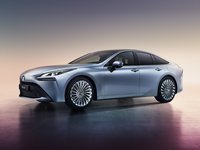
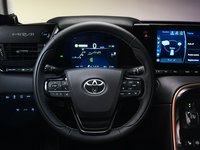
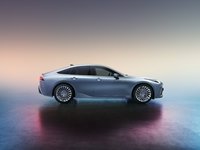
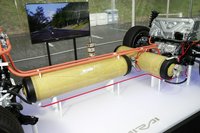
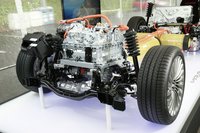
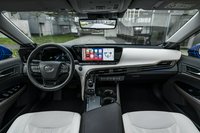
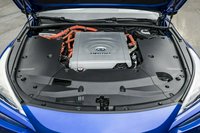
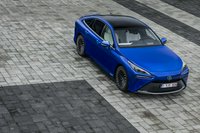
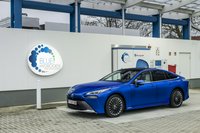
Product Overview
The 2nd-generation Toyota Mirai is constructed on Toyota's latest rear-wheel-drive modular platform, GA-L. The GA-L platform is engineered to accommodate the hydrogen fuel-cell powertrain, amongst others. The new platform enhances handling dynamics and design.
With a new 3-tank layout and fully-redesigned fuel-cell system, the 2nd-gen Mirai reaches a range of 650 km, a 30% increase over its predecessor. Updates on the fuel cell system also achieves significant reductions in the size and weight of all principal components; combined with the new RWD layout, the new Mirai achieves dramatic improvement in driving dynamics.
The new Mirai has a design echoes what many would have expected a Lexus GS would be, though the latter has been cancelled.
Ratings
What we found
Neofiliac score 62%
Pros
- Powered by zero-emission hydrogen fuel cell
- Good 0.28 drag coefficient
- Great styling
Cons
- Low performance
- Lack of hydrogen infrastructure
What external reviewers found
External score 67%
Pros
- Decent fuel cell performance
- Impressive range
- Fantastic fuel-cell power
- Sleek design
- Sleek styling
Cons
- Lack of charging infrastructure
- Not as quiet as its predecessor
- Lack of charging stations
- Not the most efficient
- Expensive for what you get
- Cheap to run in the UK
Your rating:
12345678910
?/10
Price Comparison
As associates of the merchants above, we earn a commission when you make a purchase using the supplied links.
Specifications
[{"Ft":"Capacity","Fn":"Fuel Capacity","Fv":"5.6 L / 1.5 gal"},{"Ft":"Capacity","Fn":"Passengers","Fv":"5"},{"Ft":"Capacity","Fn":"Payload","Fv":"465 kg / 1025 lbs"},{"Ft":"Chassis","Fn":"Brakes | Front","Fv":"Ventilated discs"},{"Ft":"Chassis","Fn":"Brakes | Rear","Fv":"Ventilated discs"},{"Ft":"Chassis","Fn":"Power Steering","Fv":"Electric Steering"},{"Ft":"Chassis","Fn":"Suspension | Front","Fv":"Multi-link"},{"Ft":"Chassis","Fn":"Suspension | Rear","Fv":"Multi-link"},{"Ft":"Chassis","Fn":"Tire Size","Fv":"235/55 R19, 245/45 R20"},{"Ft":"Chassis","Fn":"Turning Circle","Fv":"12.6 m / 41.3 ft"},{"Ft":"Construction","Fn":"Battery | Capacity","Fv":"1.2 kWh (gross)"},{"Ft":"Construction","Fn":"Battery | Type","Fv":"Lithium-ion"},{"Ft":"Construction","Fn":"Battery | Voltage","Fv":"310.8 V"},{"Ft":"Construction","Fn":"Body Style","Fv":"4-door hydrogen fuel cell Sedan"},{"Ft":"Dimensions","Fn":"Ground Clearance","Fv":"150 mm / 5.9 in"},{"Ft":"Dimensions","Fn":"Size | Height","Fv":"1480 mm / 58.3 in"},{"Ft":"Dimensions","Fn":"Size | Length","Fv":"4975 mm / 195.9 in"},{"Ft":"Dimensions","Fn":"Size | Width","Fv":"1885 mm / 74.2 in"},{"Ft":"Dimensions","Fn":"Track Width | Front","Fv":"1610.0 mm / 63.4 in"},{"Ft":"Dimensions","Fn":"Track Width | Rear","Fv":"1605.0 mm / 63.2 in"},{"Ft":"Dimensions","Fn":"Weight","Fv":"1900.0 kg / 4188.8 lbs"},{"Ft":"Dimensions","Fn":"Wheel Size","Fv":"8.0J x 19, 8.5J x 20"},{"Ft":"Dimensions","Fn":"Wheelbase","Fv":"2920 mm / 115.0 in"},{"Ft":"Performance","Fn":"Acceleration | 0 - 100 km/h","Fv":"9.2 sec"},{"Ft":"Performance","Fn":"Acceleration | 0 - 60 mph","Fv":"8.7 sec"},{"Ft":"Performance","Fn":"Coefficient Of Drag","Fv":"0.29"},{"Ft":"Performance","Fn":"Top Speed","Fv":"175.0 km/h / 108.7 mph"},{"Ft":"Powertrain","Fn":"Drivetrain Layout","Fv":"Rear-engine (transverse), Rear-wheel drive"},{"Ft":"Powertrain","Fn":"Engine | Power","Fv":"182 hp / 135.7 kW"},{"Ft":"Powertrain","Fn":"Engine | Type","Fv":"hydrogen engine"},{"Ft":"Powertrain","Fn":"Transmission | Gears","Fv":"1-speed"},{"Ft":"Powertrain","Fn":"Transmission | Type","Fv":"Automatic"},{"Ft":"Production","Fn":"Availability","Fv":"2020"}]
External Reviews
autocar[1]
Reviewer score 60% (normalized by Neofiliac)The new Mirai is rear-wheel drive, and between the bonnet and the rear wheels there are three hydrogen tanks rather than a drivetrain. Between them, they hold 5.6kg of hydrogen. The Mirai weighs 1950kg, which is quite heavy, but a BEV of the same size and range would weigh more. Toyota still isn’t going to sell as many Mirais as it does Camrys.
Pros
- Bigger and better-looking than its predecessor
- Lots of room for fuel cells
Cons
- Not as quiet as its predecessor
autoexpress[2]
Reviewer score 64% (normalized by Neofiliac)Toyota Mirai is more powerful, more luxurious and better equipped than the first-gen. Prices now start from £49,995 - the best part of ten grand for the performance. The ride is forgiving - even on top spec Design Premium Pack trim's 20-inch wheels. The car is neatly balanced front to rear, so it feels stable and predictable.
Pros
- Sleek design
- Powerful electric motor
- Impressive range
Cons
- Lack of charging stations
- Not the most efficient
carmagazine[3]
Reviewer score 70% (normalized by Neofiliac)Fuel cell stack has been shrunk from 33 to 24 litres, and resulting power climbs by half to 5.4kW/litre. Soundproofing is ace, assisted by zero moving parts in fuel cells. Light steering is effortless, steady but accurate, and the suspension softly-sprung.
Pros
- Sleek styling
- Smooth, quiet ride
- Decent fuel cell performance
Cons
- Cheap to run
cnet[4]
Reviewer score 75% (normalized by Neofiliac)The Mirai's rear-wheel-drive architecture is shared with the larger Lexus LS. With a starting MSRP of $50,455, the new Mirai is more than $9,000 cheaper than the old model. Toyota estimates a 9.2-second 0-to-60-mph time.
Pros
- Fantastic fuel-cell power
- Sleek styling
- Smooth ride
Cons
- Expensive for what you get
Also Check
References
<
>
x